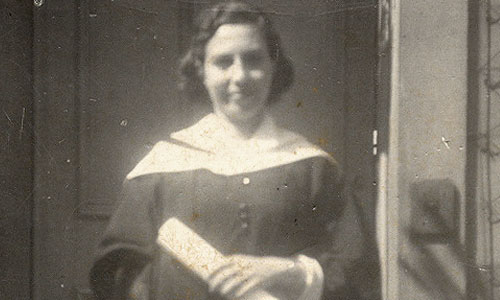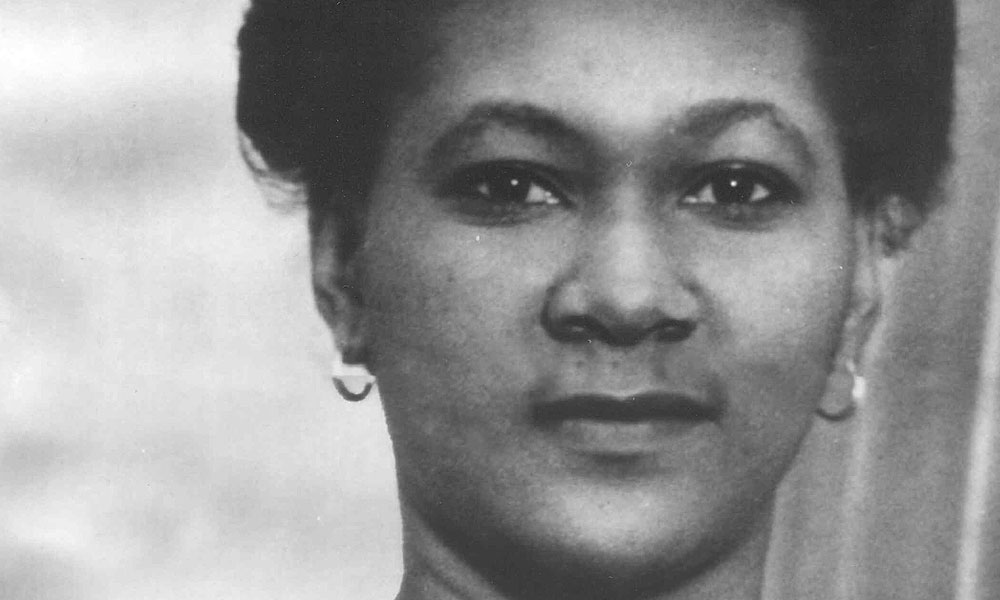
Kathleen Dorothy, the only daughter of Thomas Manchester and his wife Ada Killikelly was born in Sandy Point on the 4th December 1923. Kathleen’s memory of those years are idyllic, picnics with her parents, hiding in the garden. They were marred by the memories of the Hurricane of 1928 which tore the roof of the family house. That same year Ada died and the little girl passed into the hands of four aunts. With no children of their own, Louisa, Gwendolyn, Winifred and Alice Manchester lavished their attention on their orphaned niece and treated her like a little princess. This left her father free to throw his energies into the political arena where he founded and, for a number of years, lead the Workers’ League.
At age five little Kathleen was sent to a school run by Miss Liz Clarke at Rose Cottage, Downing Street Sandy Point. Plagued with Tonsillitis throughout her early childhood, the little girl often had to spend days in bed with feverish colds. She read widely to while away the time amplifying both her vocabulary and her imagination. At nine years of age she entered the Girls’ High School or Miss Pickard’s school as it was then known where the girls learnt not only academic subjects but also practical ones such as first aid, home nursing and book repair. They were also taught to value dignity, discipline, cleanliness, service to and participation in the community. Her recollections of her school days were vivacious. Travelling to and from Sandy Point on a daily basis was no easy task in those days so arrangements were made for young Kathleen to remain in Basseterre during the week. She stayed at home of Mrs. Lou Challenger, her father’s cousin and the mother of his comrade-in-arms, Edgar Challenger.
In December 1941, Kathleen Manchester joined the Civil Service as a junior clerk in Administration. Her father’s failing business interests which had repercussions on her aunts’ fortunes and his declining health would have meant that she had to place herself in a position that would guarantee some independence. Thomas Manchester died on the 31st January 1943 and Kathleen continued in the service for another four years.
In 1949, , she went to Canada to pursue her studies. Alan Manchester, her paternal uncle gave her accommodation. Kathleen had hoped to pursue studies at the University of Toronto but a late arrival prevented her enrolment as a full-time student. Instead she opted to take evening classes at the same University. She left Canada in the spring of 1950 after having been involved in an auto-mobile accident.
On the 4th July 1958, Kathleen Manchester graduated with a Masters in English from the University of Edinburgh. She was probably the first Kittitian woman to achieve that academic distinction. She was also given an award by the Senate of the University to research Constitutional Developments in the West Indies since 1832 with special reference to the Leeward Islands for her Doctorate
Manchester visited St. Kitts soon after graduation on what she intended would be a research visit and in December she wrote a progress report on her work which showed that she had covered a great deal of ground in St. Kitts. However she now faced domestic obligations which conflicted with her academic commitments, as her three elderly aunts were ailing and in need of her support. Her plans for an early return to Scotland were put on hold but she continued the research for her doctoral dissertation.
To supplement her award from the University she also took a part-time secretarial post and worked as a lecturer for the Extra-Mural Department of the University College of the West Indies. She also taught English and History at her old school - the Girl’s High School. Her students remember her as an eccentric teacher who inspired them with her love of language.
Her interest in history seems to have coincided with a similar interest shared by Robert Bradshaw He was anxious to assist the daughter of the founder of the party he was leading. His recommendation that she should be given the job to manage the archives facilitated the research that Manchester wanted to do and he hoped that it would bring order to the records. Manchester threw herself into the job with a passion. She recognised the value of the records and hand copied records herself and at times paid some youngster to help her.
Her work however came to an abrupt end when someone raised a suspicion that her interest in the records went beyond research. Police were sent to her house to take possession of records that she had carried there and she was banned from returning to the Archives. It was a restriction that was repeated again in 1966 when she asked for permission to return to resume research for her Ph.D. and to double check material for her upcoming publication. Unfortunately the suspicions had not subsided and she was not allowed to return though she was given access to microfilmed material.
Stays in Barbados and Trinidad followed. There she worked as a freelance journalist for newspapers and radio and continued her efforts to write both fiction and non-fiction works. In Barbados she covered the Independence celebrations and produce among others a programme on the moves towards universal suffrage which aired on Independence Day. Radio Trinidad featured some of her writings on a programme called Monitor. It was during her time in Trinidad that she completed and in 1971 finally published her book Historic Heritage of St. Kitts, Nevis and Anguilla a small but comprehensive and well-illustrated encyclopaedia that covered a wide array of topics, from the Siege of Brimstone Hill to carnival queen shows. A comment in her Acknowledgements attests to the difficulties she experienced,
I appreciate the help of the many persons who assisted in checking the material. (I also include all “obstructionists,” who provided the grit in the oyster, producing this “pearl!”)
Manchester bore the cost of publication which she tried to recoup through the sale of advertising space in the book.
Confident in her own talent and undeterred by the lack of public interest, Manchester prepared other material for publication under the pseudonym of Kathleen Killikelly. Unfortunately it was not completed. As Miss Katie, dressed in traditional costume, Manchester entertained locals and foreign visitors and dignitaries with skits in Kittitian dialect and was often invited to perform at state functions but life as a freelance journalist, novelist and sometime teacher was far from lucrative.
Eric Skerrit, a successful businessman in St. Kitts who owned a copy of her book, quickly realised that the demand for it warranted a second printing. He even offered to pay for the printing of the first five hundred copies. Enthused at the prospect of her work being circulated again, Manchester returned to St. Kitts, not for a second printing but to write an update. She put all her energy into the undertaking and visited government departments, businesses, organisations and individuals with “painful persistence” to gather the required information and photographs for her new publication. However to many she had become a “bothersome” person who talked incessantly and she found it difficult to raise the much needed interest and support for her endeavour.
Misunderstood and unappreciated, Manchester’s last years were marked by increased bitterness. She continued to live alone in Sandy Point. Often in difficult financial circumstances, she could do nothing as portions of her work, the result of years of her research, were used wholesale in other publications and her authorship was never acknowledged. Still she plodded on hoping to re-publish her beloved Historic Heritage. Kathleen Manchester died alone at her home in Sandy Point on the 21st January 1992. Her friend, benefactor and old school mate, Agnes Skerrit rescued her from a pauper’s burial and started preparations for her funeral until other members of the community took charge.




